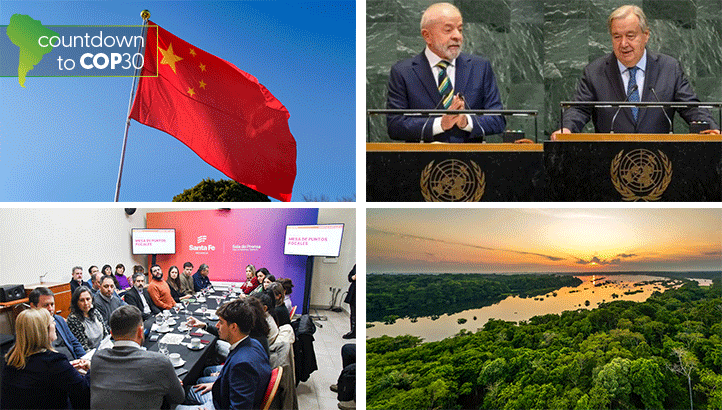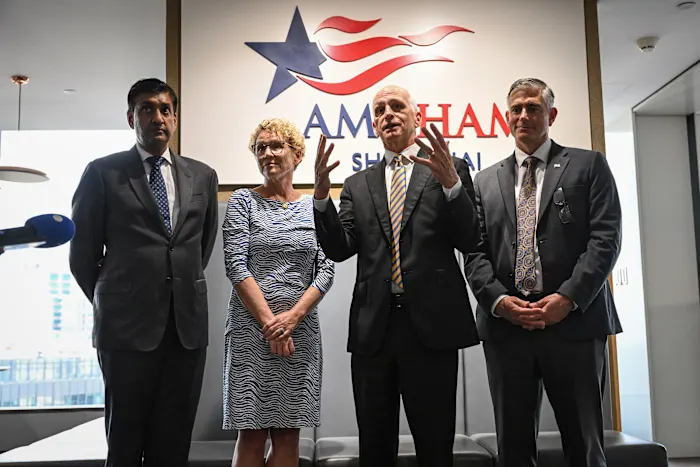COP30 Action Tracker: China and Australia rapped for ‘unambitious’ new climate targets at UN in New York
By Sarah George
Copyright edie

COP30 is the UN’s 30th annual climate summit. It will bring together thousands of policymakers, negotiators, climate activists, civil society groups, business decision-makers and other attendees for two weeks in Belem, Brazil, from 10 November 2025.
As with all UN climate summits, it is a major event in the diary for anyone working in – or passionate about – climate action and sustainable development.
This year’s COP will take place in Belém, Brazil, from 10 to 21 November.
COP30 is the first to be hosted in the Amazon Rainforest and the first with artificial intelligence (AI) as an official thematic agenda item.
With global climate diplomacy evolving at a pace, edie is running the COP30 Action Tracker – a regular feature rounding up all of the business and policy preparations being made here in Europe and across the world. Read on for our second edition.
The first edition can be found here.
The numbers
130 countries have submitted a new NDC
223 weeks left until 2030
77% of GDP covered by national net-zero targets
8,955 businesses with SBTi-verified emissions targets
2,128 businesses verified with the SBTi’s Net-Zero Standard
The headlines
Brazil’s Lula announces $1bn investment in global tropical forest fund
Australian Government releases new 2035 emissions target
Belem residents evicted in push for profits from COP30 rentals
Donald Trump criticises countries’ climate policies in UN speech
Gap between climate targets and fossil fuel expansion plans widens
Summit preparations
Brazil’s President Luiz Inacio Lula da Silva has been in New York this week, announcing a $1bn investment in the Tropical Forests Forever Facility (TFFF). Originally proposed by the World Bank in 2000, the Facility is set to convene public and private investments for broadleaf forest conservation and restoration through a multilateral development bank.
The idea is to catalyse funding flows to forest-rich, low-income countries – predominantly in the Global South.
Brazil is the first nation to commit a contribution to the fund, which it is hoping to grow and operationalise at the COP. Nations including France, Germany, Norway and the UAW previously expressed interest in supporting the Facility.
In a more muted announcement, the COP30 Presidency team has officially launched a new platform showcasing an array of climate solutions already being deployed across the world. This is known as the ‘Granary of Solutions’.
The team said the platform will be “continuously populated in waves”, with additional solutions set to be added before, during and after COP30.
“Far from starting from zero, the world has already built a powerful foundation of solutions to deliver the transition,” said COP30 Climate High-Level Champion Dan Ioschpe. “Our task now is to accelerate what works, provide a collaborative and supporting environment, and ensure these solutions reach the people and places where they can have the greatest impact.”
And, finally, the COP accommodation crunch continues. The Guardian has spoken to working-class families who have been forced to give up rented accommodation in Belem, due to property managers prioritising tenants who are COP30 delegates.
Nonetheless, it spoke to locals who are adamant that the region’s push to host the summit was the right choice.
The UN has already urged its teams to limit the number of delegates it sends to Belem due to capacity constraints. COP30 is expected to welcome around 50,000 attendees, compared to almost 57,000 at COP29 and 97,000 at COP28.
Global moves
World leaders have gathered this week in New York for the UN’s annual General Assembly (UNGA). This is the last large-scale UN meeting before the COP.
While the US’s Donald Trump went rogue, calling coal “clean” and carbon emissions “a hoax”, the High Ambition Coalition of 117 countries reaffirmed their commitment to the Paris Agreement. They stated that their priorities at COP will include setting up tracking for a “just, orderly and equitable” low-carbon transition.
Late on Wednesday (24 September), more than 100 nations submitted (at least in part), their updated Nationally Determined Contributions (NDCs) – their plans for delivering their fair share of emissions reductions under the Paris Agreement.
Collectively, the World Resources Institute has calculated, the NDCs would reduce global emissions by just two gigatonnes in 2035 – only 6% of what’s needed for 1.5°C and 10% for 2°C.
Institute president Ani Dasgupta said: “We cannot sugarcoat it: these new climate plans do not put us anywhere near on track for a safe future. The lack of ambition so far from most major emitters, barring a few, underscores the immense political challenge countries face in transforming their entire economy. Yet vulnerable countries continue to step up with bold climate leadership.”
China’s announcement dominated media headlines: It pledged a reduction in greenhouse gas emissions of 7-10%, compared to peak levels, by 2035. China also pledged to bring the share of renewables and nuclear in total energy consumption to 30%+ within this timeframe.
Commentators have called these pledges underwhelming, given China’s global leadership in renewable energy manufacturing and its status as the world’s second-largest emitter.
Australia is another one of the early movers. It has pledged that greenhouse gas emissions in 2035 will be 62-70% lower than they were in 2005. A reduction of around 27% has already been achieved.
Nonetheless, advocates want to see more ambition. 350.org called the target “a bit of a cop-out” and the Climate Council claims that a 75% target would result in a $227bn increase in GDP over the next decade, relative to a weaker 65% target.
In other news, the EU is set to propose a one-year delay to its flagship ban on imported goods linked to deforestation overseas.
The EU Deforestation Regulation mandates that products derived from beef, cocoa, coffee, palm oil, natural rubber, soy or wood must be “deforestation-free” and legally produced to be placed on the EU market. The burden of complying or explaining sits with importing businesses. Deforestation after 2020 is taken into account.
Commission members have been asked to consider an additional 12-month delay because setting up the IT system to handle data relating to product transactions is taking longer than expected.
Environmental NGOs have slammed the proposals, stating that they show the law is being deprioritised and allow time for it to be weakened.
UK updates
The last edition of this Action Tracker included news of the UK Government’s cabinet reshuffle, which saw a new Environment Secretary and Foreign Secretary appointed, alongside new junior energy ministers and a new climate minister.
The Guardian has reported that new Environment Secretary Emma Reynolds and new Housing Secretary Steve Reed have ordered the Environment Agency not to block planning applications on environmental grounds.
The Labour-led government has pledged to deliver 1.5 million new homes and 150 major infrastructure projects this Parliament. It has been accused of weakening nature and pollution safeguards in the name of growth.
In other news, the UK is among the latest nations to have ratified the High Seas Treaty, which will now become law in January 2026 after the requisite 60 nations signed up.
The Treaty, otherwise known as the Biodiversity Beyond National Jurisdiction (BBNJ) agreement, has been almost two decades in the making. It will support the designation of at least 30% of international waters as protected marine areas, with the aim of conserving the natural ocean environment and halting nature loss by 2030.
Nonetheless, the UK will not implement a full ban on bottom trawling across all Marine Protected Areas – a decision criticised by environmental NGOs.
Words of wisdom
“This new era of climate action must be about bringing our process closer to the real economy: accelerating implementation and spreading the colossal benefits of climate action to billions more people.
“Connecting the cabinet rooms closer to the boardrooms to the living rooms is how we supercharge climate action, and get this job done.” – Simon Stiell, executive secretary of the UN Framework Convention on Climate Change
Editor’s note: The COP29 Action Tracker will be published at least once every two weeks in the run-up to the summit.



